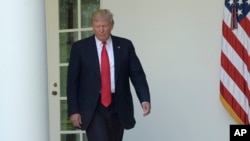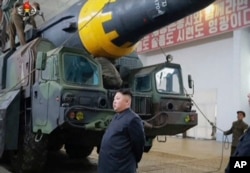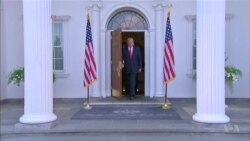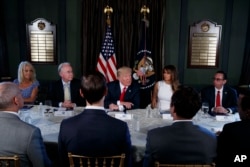President Donald Trump is facing his greatest foreign policy challenge to date in dealing with a nuclear-potent North Korea. But the test comes at a difficult time politically for the president. Recent polls show that Trump’s standing at home has weakened because of doubts about his leadership and his stalled domestic agenda.
The president dominated the headlines this week with his blunt warning in the midst of more nuclear saber-rattling from North Korea. “They will be met with fire, fury and frankly, power, the likes of which this world has never seen before,” Trump told reporters during an event at his golf club in New Jersey.
Trump’s remarks sparked strong reactions from both sides of the political spectrum. Democrats were generally critical. “The president’s most recent comments were recklessly belligerent,” said House Democratic leader Nancy Pelosi in a statement.
Former U.S. ambassador to the United Nations Bill Richardson said Trump’s comments were “unfortunate,” but said the president could recover. "I think the president has a chance to rally the nation, to address our country on what the policy is, but most importantly, to calm down,” Richardson told AP television.
Republicans in many cases were more supportive. South Carolina Senator Lindsey Graham said Trump’s warning was “probably necessary.” Graham told CBS that he believes Trump is determined not to “contain the threat. He’s going to stop the threat.”
Campaign echoes
Americans got used to Trump’s tough rhetoric during last year’s election campaign. But many analysts contend that the standard is different now that he is president.
“He is very impulsive,” said University of Virginia political expert Larry Sabato via Skype. “Now I suppose you could argue that abroad that may be a plus when your enemies and adversaries think they are dealing with someone who doesn’t exactly have a cool head. On the other hand, when you are dealing with nuclear weapons, I’d say it was in everybody’s interests, including America’s interests, to have someone with a cool head.”
But Trump defenders said his blunt warning is exactly what his supporters expect.
Watch: Trump Faces Crisis on North Korea Amid Backdrop of Sliding Polls
“This is not the Obama White House. This is the Trump White House,” said Trump adviser Sebastian Gorka in an interview with VOA's sister station Al-Hurra. “We do not tell people in advance, if they are adversaries, what we are going to do.”
Trump’s challenge in dealing with North Korea comes in the wake of recent polls that show the his approval rating at home dipping to new lows, even among Republicans. “In the beginning, the vast majority of the people who voted for him strongly supported him, strongly approved of his job performance,” said Sabato. “Now, in most surveys, it is down somewhere between 17 and 24 percent.”
Trump’s overall approval rating continues to hover in the mid to high 30s, a historical low for a new president.
All about the base
Trump faces a stalled congressional agenda domestically, and he often returns to his core supporters for a boost, as he did recently in West Virginia.
Trump’s reliance on his base is not surprising to George Mason University analyst Jeremy Mayer. “By normal presidential standards, he is failing,” Mayer told VOA via Skype. “But he is not a normal president, and to many of his base, the fact that he is so disruptive is something they like.”
Mayer added that it was still possible for Trump to turn around his domestic standing by reaching out to Democrats on a bipartisan compromise to shore up the health insurance markets after a Republican bill was blocked in the Senate. “By traditional standards, this is a very bad trajectory. That said, it is not too late in the game,” he said.
Critical threat
Recent polls show a clear majority of Americans sees North Korea as a serious security threat.
A recent survey by the Chicago Council on Global Affairs found that 75 percent now believe North Korea poses a critical threat to the U.S., up from 55 percent two years ago.
But the polls also suggest most Americans are questioning whether the president is up to handling the threat. A CBS News poll in early August found that only 35 percent of those surveyed were “confident” in Trump’s ability to handle the situation, while 61 percent said they were “uneasy.”









